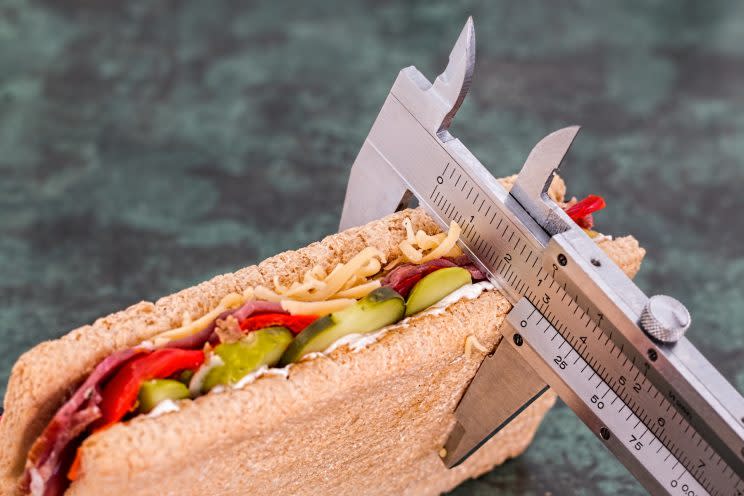Five science myths which you probably believe are true

Many of us manage to get through school with some pretty silly ideas still intact – such as the ‘fact’ that the moon has a ‘dark side’.
Other science myths seem to provide us with useful excuses – such as the idea that being pregnant causes ‘baby brain’ or that it’s safe to eat food dropped on the floor.
MORE: Dog gatecrashes orchestra performance – and steals the show
MORE: Mail firm halts deliveries after notorious crow keeps attacking postman
So own up – how many of these supposedly scientific ‘facts’ do you believe?
The ‘dark side of the moon’

Sorry, Pink Floyd fans, but there isn’t a ‘dark side’ of the Moon – there’s just one side which isn’t visible from Earth.
The moon is ‘tidally locked’ to Earth, so we only ever see one side of it – but the ‘other’ side is not dark, as it is still lit up by the sun.
NASA lunar geologist Noah Petro said, ‘The only way we can see the far side of the moon is with a spacecraft. There is no dark side of the moon- there’s a far side.’
The five-second rule

Many of us believe in variations of the ‘five second rule’ – that it’s basically OK to pick up food dropped on the floor, as long as you do it quickly.
But actually food picks up bacteria pretty much instantly, according to tests by Dr Lisa Ackerley of the University of Salford.
It’s not guaranteed that the bacteria your food picks up will be dangerous – that’s down to what you’ve spilt on the floor before – so people do often get away with eating food dropped on the floor.
What is certain, however, is that it’s picked up bacteria – however short a period it’s been down there for.
Baby brain

Many new mothers are convinced the new arrival has robbed them of their grey matter – blaming ‘baby brain’ for any vague moments.
But many scientists now believe that the whole idea is a myth.
Experts at New Scientist reviewed the existing scientific literature on the phenomenon – and found that there is little evidence that motherhood reduces brain power.
The brain DOES shrink during pregnancy – but it rapidly bounces back and areas key to reasoning, empathy and emotions are ‘supercharged’, the magazine reported.
In fact, mothers are often more assertive, better able to cope with stress, and perhaps even better at multi-tasking.
Dr Kelly Lambert told New Scientist, ‘Being able to be more efficient in your decision-making, being emotionally resilient, maybe being able to engage in different strategies to solve a problem – that sounds like a wonderful executive or manager to me.’
Sugar makes children hyperactive
Many parents roll their eyes and talk about children ‘bouncing off the walls’ once they’ve eaten sugary snacks.
But actually there’s very little evidence that sugar affects behaviour in this way.
Researcher Dr. Mark Wolraich conducted a study on what he terms the ‘sugar myth’ – and found no evidence sugar affected behaviour.
Instead, events such as birthday parties, where children are often given cake and other sugary treats, are exciting in themselves, Wolraich says.
Yo yo diets are bad for you

Controversial new research has suggested that ‘yo yo dieting’ isn’t actually bad for you – at least compared to not dieting at all.
US biostatistician Dr David Allison found that repeated crash diets did no harm to obese mice.
In fact, serial dieting animals lived longer than those that remained obese.
Dr Allison, from the University of Alabama in Birmingham, said: ‘If you go the dentist for your six month evaluation, they find there’s some plaque around your teeth and scrape it off, and then they give you a toothbrush and piece of string and send you out and say keep up the good work.
‘We think it’s probably not a bad idea to lose weight even if you are going to gain it back and redo it every few years.”
Cats don’t really like their owners – and just ‘use’ them for food
Many people (especially those who aren’t fond of cats) believe that the animals are aloof and stand-offish – and basically ‘use’ their human owners as a two-legged food supply.
But that’s not actually true, however much dog lovers might want it to be, according to a new study.
In fact, cats not only enjoy human company, they would actually pick spending time with ‘their’ human over the opportunity to eat food.
Researchers from Oregon State University took 50 cats (some shelter cats and some cats from homes) and deprived them of food, scents, human contact and toys for a few hours.
They reintroduced the stimuli (food, scent, people and toys) and watched which one the cats chose.
Many of the cats chose to socialise with humans, rather than eat.
The authors of the study wrote: ‘While it has been suggested that cat sociality exists on a continuum, perhaps skewed toward independency, we have found that 50% of cats tested preferred interaction with the social stimulus even though they had a direct choice between social interaction with a human and their other most preferred stimuli from the three other stimulus categories.’

 Yahoo News
Yahoo News 

